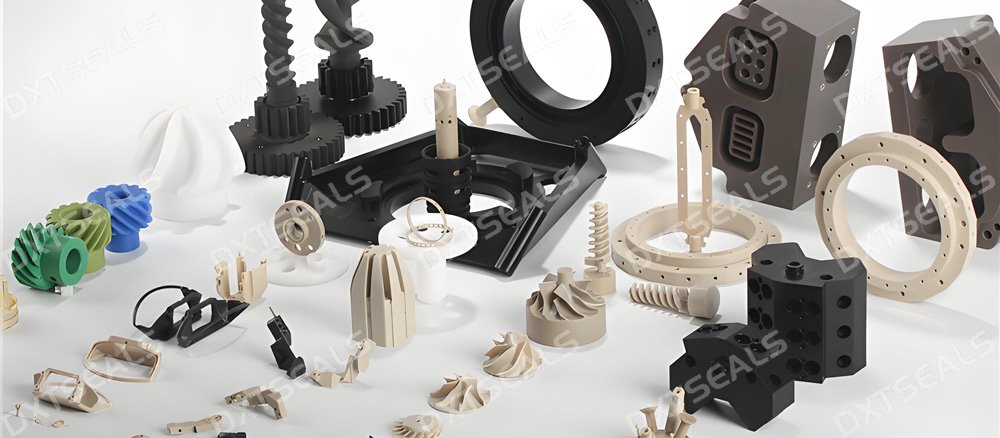
In industries where extreme heat is a constant challenge, selecting the right material is crucial for ensuring performance, durability, and efficiency. Polyetheretherketone (PEEK) has emerged as one of the best high-performance plastics for demanding applications in high-temperature environments. Known for its exceptional thermal stability, mechanical strength, and chemical resistance, PEEK outperforms many traditional materials, including metals and other polymers.
This article explores what makes PEEK the best choice for high-temperature environments and its wide range of industrial applications.
1. Outstanding Thermal Stability
PEEK is widely recognized for its ability to maintain its mechanical properties under extreme heat conditions.
- High Melting Point: PEEK has a melting temperature of approximately 343°C (649°F), making it one of the most heat-resistant thermoplastics available.
- Continuous Use Temperature: It can operate continuously at temperatures as high as 250°C (482°F) without significant degradation.
- Low Thermal Expansion: Unlike many plastics that expand significantly when exposed to heat, PEEK exhibits minimal thermal expansion, ensuring dimensional stability in high-temperature applications.
This makes PEEK ideal for components in industries such as aerospace, automotive, and industrial machinery, where exposure to extreme heat is common.
2. Excellent Mechanical Strength Under Heat
Many materials lose their strength and stiffness at high temperatures, but PEEK retains its outstanding mechanical properties even in harsh conditions.
- High Tensile Strength: PEEK has a tensile strength of up to 97 MPa, allowing it to withstand heavy loads and pressure.
- Impact Resistance: It remains tough and impact-resistant even at elevated temperatures, making it suitable for demanding mechanical applications.
- Fatigue and Creep Resistance: PEEK demonstrates excellent resistance to fatigue and creep deformation, ensuring long-term durability under thermal stress.
These properties make PEEK an excellent replacement for metals in high-temperature environments, reducing weight while maintaining strength.
3. Exceptional Chemical Resistance
Many materials degrade when exposed to harsh chemicals, especially at high temperatures. However, PEEK is highly resistant to a wide range of chemicals, including:
- Acids and Bases: PEEK remains stable in acidic and alkaline environments, making it ideal for chemical processing applications.
- Hydrocarbons and Solvents: It resists degradation from fuels, oils, and industrial solvents, making it a reliable choice for aerospace and automotive components.
- Water and Steam Resistance: PEEK withstands prolonged exposure to hot water and steam, making it an excellent choice for sterilization and medical applications.
This chemical stability ensures PEEK’s longevity in extreme industrial conditions where other materials may fail.
4. Lightweight Alternative to Metals
While metals like stainless steel and titanium are often used in high-temperature applications, PEEK provides a lightweight alternative without compromising performance.
- Low Density: PEEK is about 70% lighter than steel, reducing overall system weight and improving energy efficiency.
- Corrosion Resistance: Unlike metals, PEEK does not corrode, eliminating the need for protective coatings or treatments.
- Ease of Machining: PEEK can be machined into complex shapes more easily than metals, offering greater design flexibility.
In industries such as aerospace and automotive, reducing weight is crucial for fuel efficiency and performance, making PEEK a preferred material.
5. Electrical Insulation and Thermal Conductivity
PEEK is not only mechanically strong but also possesses excellent electrical and thermal insulation properties.
- High Dielectric Strength: PEEK is an excellent electrical insulator, making it ideal for use in high-temperature electrical and electronic applications.
- Controlled Thermal Conductivity: While naturally insulating, PEEK can also be modified with fillers to enhance its thermal conductivity when needed.
This makes PEEK a valuable material in electrical, semiconductor, and energy industries where high-temperature insulation is required.
Common Applications of PEEK in High-Temperature Environments
Thanks to its unique combination of properties, PEEK is used in a variety of industries where high-temperature resistance is essential:
- Aerospace: Used in engine components, brackets, and thermal insulation parts due to its heat resistance and lightweight nature.
- Automotive: Ideal for transmission components, seals, and bearings, replacing metal parts to improve fuel efficiency.
- Oil & Gas: Used in seals, valves, and downhole equipment that must withstand high heat and chemical exposure.
- Medical & Sterilization: Common in surgical instruments and medical implants due to its steam resistance and biocompatibility.
- Semiconductors & Electronics: Used in high-temperature connectors and insulation components.
Conclusion
PEEK stands out as the ultimate material for high-temperature applications, thanks to its exceptional thermal stability, mechanical strength, chemical resistance, and lightweight advantages. Whether in aerospace, automotive, oil and gas, or medical industries, PEEK continues to replace traditional materials, offering enhanced performance and reliability.
If you need a high-performance material that excels in extreme conditions, PEEK is the go-to choice for superior durability, efficiency, and longevity.
